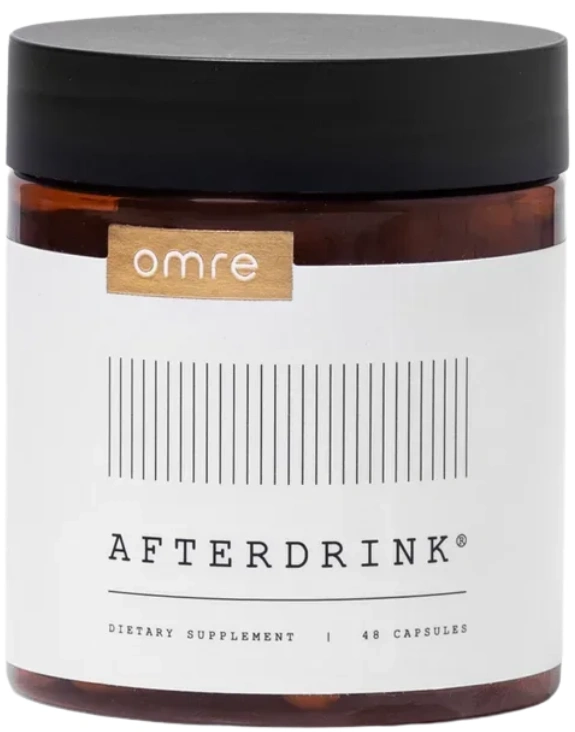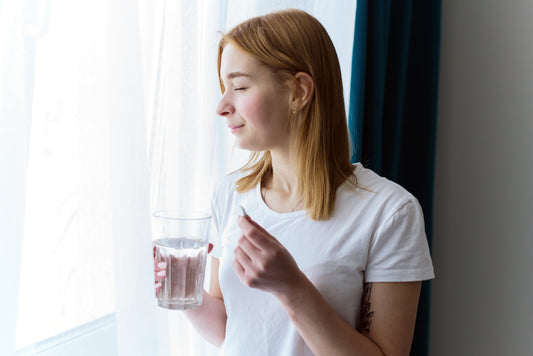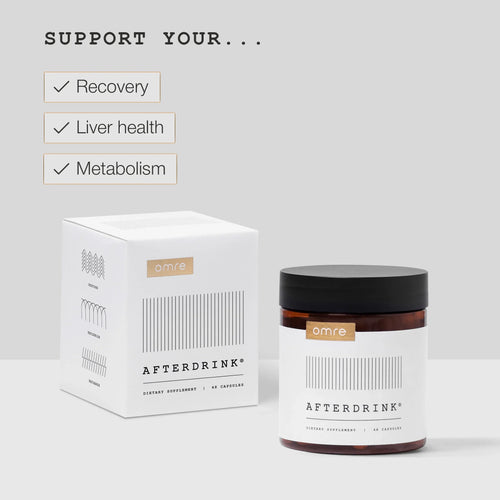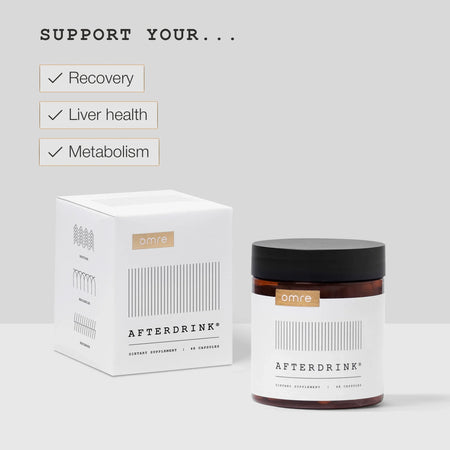Table of Contents
- What is Advil?
- How Advil (Ibuprofen) Works in the Body
- Does Ibuprofen Help With Hangovers?
- Is It Safe to Take Advil for a Hangover?
- When Can You Take It?
- Risks of Taking Advil After Drinking
- Does Advil Actually Help Hangover Symptoms?
- Advil vs Other Options for Hangovers
- Can You Take Advil Before Drinking to Prevent a Hangover?
- When to Use Advil for a Hangover
- When to Avoid Advil for a Hangover
- Conclusion
- FAQs
Taking Advil or other ibuprofen-based pain relievers the morning after drinking can help ease a pounding headache or sore muscles. But it's not a full hangover fix. While ibuprofen can reduce some of the pain, it won’t touch the nausea, fatigue, or brain fog.
And if you take it too soon, before the alcohol is fully out of your system, it could do more harm than good.
In this article, we'll look at how Advil works, whether it's safe to take after drinking, what symptoms it can help with, and what risks you should know before reaching into your medicine cabinet.
A supercharged antioxidant designed to support recovery, made from the very best, research-backed ingredients on the market.*AFTERDRINK®
What is Advil?
Advil is a common over-the-counter pain reliever made with ibuprofen. It belongs to a group of medications called NSAIDs, or nonsteroidal anti-inflammatory drugs. People use it to treat headaches, body aches, fevers, and other inflammation-related issues.
Ibuprofen works by blocking certain chemicals in the body that cause pain and swelling. Advil is just a brand name, but it works the same way as generic ibuprofen or similar options like Motrin.
You can find Advil in many forms, including tablets, liquid gels, and chewables. While it’s easy to access and generally safe when used as directed, it can still cause side effects, especially when mixed with alcohol.
How Advil (Ibuprofen) Works in the Body
Ibuprofen works by stopping enzymes called COX-1 and COX-2. These enzymes help produce prostaglandins, which are chemicals that trigger inflammation, pain, and fever. By reducing these chemicals, ibuprofen helps lower discomfort.
This is why ibuprofen is often used for muscle pain, headaches, and even menstrual cramps. It basically calms the body's pain response.
But keep in mind that while it works well for pain, it can also irritate the stomach lining and affect the kidneys when used too often or in the wrong way.
When alcohol is involved, things get more complicated. Both ibuprofen and alcohol are processed through the liver and kidneys, which can lead to extra stress on those organs when combined.
Does Ibuprofen Help With Hangovers?
Ibuprofen can help with hangover-related pain like headaches and muscle aches, but it doesn’t treat all hangover symptoms. It’s not a magic fix for nausea, fatigue, or the overall groggy feeling.
What ibuprofen does best is reduce inflammation. Since hangovers are partly caused by inflammation from alcohol, that’s why Advil might seem to help.
A study published in Cephalalgia even found that NSAIDs like ibuprofen were effective at relieving some hangover headaches (1).
However, symptoms like dehydration, stomach upset, and low energy are not caused by inflammation alone. This is why ibuprofen might only give you partial relief. Hydration, sleep, and food are still your best go-to options.
For adults, the recommended dosage of Advil is up to 400 mg every four to six hours, with no more than 1,200 mg in a 24-hour period.
Always follow the label instructions and avoid taking more than the suggested amount.
Is It Safe to Take Advil for a Hangover?
-v1748306780601.webp) Advil is generally safe to take the next morning, if the alcohol has left your system. But there are some big warnings to consider.
Advil is generally safe to take the next morning, if the alcohol has left your system. But there are some big warnings to consider.
The main concern is your stomach. Alcohol can irritate the stomach lining, and so can ibuprofen. Taking both too close together increases the risk of stomach pain, ulcers, or even internal bleeding, especially if you drink heavily or take NSAIDs often.
Another issue is kidney strain. Both alcohol and NSAIDs affect how the kidneys filter waste. Taking ibuprofen too soon after drinking may stress the kidneys unnecessarily.
If you only had a couple of drinks and you're not dealing with any existing stomach, liver, or kidney problems, taking a standard dose of Advil when hungover is usually okay, but always with food and water.
When Can You Take It?
You should wait until alcohol has cleared your system before taking ibuprofen. This depends on how much you drank and how long it’s been since your last drink.
Here are some tips:
Wait at least 10 to 12 hours after your last drink if you drank heavily.
Make sure you’re no longer feeling buzzed or intoxicated. If you’re still feeling tipsy, it’s too soon.
Eat a full meal before taking Advil to protect your stomach.
Drink water first to start rehydrating your body.
Risks of Taking Advil After Drinking
Mixing alcohol and Advil doesn’t usually cause immediate danger if done once in a while. But regular use can lead to serious problems.
Ibuprofen lowers the stomach’s natural protective lining. Alcohol also irritates this lining. Together, they can increase the risk of developing ulcers or gastrointestinal bleeding, especially in people with sensitive stomachs.
Your kidneys also filter both substances. Too much of either, or both at the same time, can put a strain on them. This is particularly risky if you’re dehydrated, which is common during a hangover.
There’s also the liver to consider. Although ibuprofen isn’t as harsh on the liver as acetaminophen (Tylenol), it still gets processed there. If your liver is already working overtime to break down alcohol, adding ibuprofen might slow things down or cause inflammation.
People with health conditions like ulcers, kidney disease, or liver problems should be extra careful. When in doubt, speak with a doctor before using NSAIDs after drinking.
AFTERDRINK®
A supercharged antioxidant designed to support recovery, made from the very best, research-backed ingredients on the market.*
Does Advil Actually Help Hangover Symptoms?
Advil may help with certain symptoms, but not all. It’s best used as part of a larger hangover recovery plan, not the only solution.
What It Might Help With
Advil targets inflammation and pain. It may offer relief for:
Headaches and migraines
Muscle aches and joint pain
Sinus pressure
Sore or stiff neck
These are common during hangovers, especially after a night of poor sleep and dehydration.
What It Won’t Help With
Advil doesn’t do much for symptoms caused by dehydration or chemical imbalances. It likely won’t help with:
Nausea or vomiting
Dizziness or lightheadedness
Fatigue or low energy
Dry mouth or thirst
Sensitivity to light and sound
For these symptoms, water, electrolytes, rest, and a balanced meal are far more effective.
Advil vs Other Options for Hangovers
Advil can help with certain hangover symptoms, but it's not your only option. Let’s see how it compares to other popular choices.
Advil vs Tylenol
Advil is generally safer than Tylenol after drinking alcohol, but both come with risks. The big difference lies in how each affects your liver.
Tylenol (acetaminophen) is processed mostly by the liver, the same organ that breaks down alcohol. Taking Tylenol after drinking can overwhelm the liver and, in some cases, cause liver damage, especially if you already drank heavily.
That’s why most experts recommend avoiding acetaminophen after alcohol.
On the other hand, ibuprofen (Advil) is less harsh on the liver but can irritate the stomach and kidneys. So if you’re choosing between the two for a hangover, Advil is often the better option, but only if taken carefully, with food, and after alcohol has cleared from your system.
Advil vs Natural Remedies
Natural hangover remedies like water, food, sleep, and electrolytes are safer and more effective for overall recovery. While Advil may help with headaches, it doesn’t address the root causes of a hangover.
A hangover usually results from dehydration, low blood sugar, and poor sleep. Rehydrating with water or a sports drink, eating a carb-rich meal, and getting quality rest can go a long way in easing your symptoms.
These don’t carry the risks of NSAIDs and are gentle on your stomach and organs.
Some people also try ginger tea for nausea or B vitamins for energy. While the research is still limited, these approaches tend to be safer and worth trying before turning to medication, unless your headache is really strong.
Can You Take Advil Before Drinking to Prevent a Hangover?
Taking Advil before drinking is not recommended and could be risky. It might seem like a smart move to prevent pain the next morning, but it doesn’t work that way.
NSAIDs like Advil reduce inflammation, but they won’t stop a hangover from developing. The real causes of a hangover, like dehydration and chemical changes, aren’t affected by ibuprofen taken in advance.
More importantly, combining Advil and alcohol at the same time can increase the chance of stomach issues or kidney stress.
One 2020 study noted that using NSAIDs alongside alcohol may raise the risk of gastrointestinal bleeding (2). If taken before drinking on an empty stomach, the chance of nausea, ulcers, or stomach upset also goes up.
The bottom line? Skip the pre-drinking pill. Focus on hydration, pacing your drinks, and eating well instead. These strategies do more for hangover prevention than any pain reliever.
When to Use Advil for a Hangover
-v1748306842662.webp) You might consider Advil for a hangover if your symptoms are mostly related to pain or inflammation. Here are some examples:
You might consider Advil for a hangover if your symptoms are mostly related to pain or inflammation. Here are some examples:
You have a pounding headache or neck stiffness
Your muscles ache from a restless night
You’ve waited at least 10 to 12 hours since your last drink
You’ve eaten a meal and are well-hydrated
You don’t have a history of ulcers or kidney issues
When to Avoid Advil for a Hangover
There are some situations where it’s better to hold off on Advil. These include:
You still feel drunk or buzzed
You haven’t eaten anything since drinking
You’re dealing with nausea, vomiting, or stomach pain
You have a history of gastrointestinal bleeding, ulcers, or kidney disease
You’ve already taken another NSAID recently
Conclusion
Advil can be helpful for hangover headaches and muscle aches, but it's not a cure-all. It won’t fix dehydration, nausea, or fatigue, and taking it too soon after drinking can be risky.
If you do choose to use it, wait until your system is clear of alcohol, drink plenty of water, and eat a good meal first.
For most people, hydration, rest, and proper nutrition are the safest and most effective ways to bounce back. If you need extra support, consider natural remedies or supplements that are easier on the stomach than NSAIDs.
 Looking for a gentler recovery option? AFTERDRINK® is packed with antioxidants and research-backed ingredients to help you feel more like yourself again.
Looking for a gentler recovery option? AFTERDRINK® is packed with antioxidants and research-backed ingredients to help you feel more like yourself again.
FAQs
Can I take Advil for a hangover?
Yes, you can take Advil for a hangover if enough time has passed since your last drink. It may help with headache and muscle pain, but it should be taken with food and water to reduce stomach irritation.
How long should I wait to take ibuprofen after drinking?
Wait at least 10 to 12 hours after drinking heavily before taking ibuprofen. This gives your body time to process the alcohol and reduces the risk of stomach or kidney issues.
Is it safe to take Advil the morning after drinking?
It’s usually safe to take Advil the next morning if you’re no longer feeling the effects of alcohol. Make sure you’ve eaten something and are staying hydrated before taking it.
Does ibuprofen help with hangover headaches?
Yes, ibuprofen can help with hangover headaches by reducing inflammation. It’s one of the most common over-the-counter options for this type of pain relief.
What’s better for hangovers: Advil or Motrin?
Advil and Motrin both contain ibuprofen, so they work the same way. The choice depends on what’s available and your personal preference.
Can I take ibuprofen while still drunk?
No, you shouldn’t take ibuprofen while still drunk. Mixing it with alcohol increases the risk of stomach bleeding, liver stress, and kidney damage. Wait until the alcohol has cleared your system.





